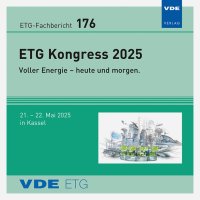Implications of the Data Governance Act and Data Act as implemen-tation of the European Data Strategy on the Energy Sector
Conference: ETG Kongress 2025 - Voller Energie – heute und morgen.
05/21/2025 at Kassel, Germany
Proceedings: ETG-Fb. 176: ETG Kongress 2025
Pages: 7Language: englishTyp: PDF
Authors:
Berkhout, Volker; Klobasa, Marian; Martin, Nicholas; Karaboga, Murat; Bergstraesser, Jonathan; Wickert, Manuel; Du, Junsong; Streblow, Rita; von der Heide, Lukas; Huelsewig, Timm; Welisch, Marijke
Abstract:
The energy industry faces unique challenges in digitalization and data utilization due to the rapidly increasing number of decentralized assets for generation and consumption, as well as their coupling with other major sectors like heat and mobility. Therefore, the opportunities and risks arising from future data regulation are of particular interest. With the Data Governance Act (DGA) and the Data Act (DA) as part of the European Commission's Digital Strategy and Digital Decade, two major regulations have been enacted. This paper discusses their implications for the energy sector. Most significantly, the DA grants operators the right to receive data generated by their assets from the manufacturer and to use it themselves or through third-party service providers. The DGA establishes a legal framework for data altruism organizations (DAO) and data intermediation service providers (DISP) that may serve in data trustee models. Based on these key elements of regulation, this paper presents three use cases with high relevance to the energy sector: Data from Home Energy Management Systems (HEMS) may improve the understanding of future load profiles of house-holds as the standard load profile will become less suitable to model the diverse characteristics of consumption of active customers. A data altruism model for donating data to a data trustee for specific purposes would build empirical data for system operators. Battery data from electric vehicles (EV) is of high interest both to the automotive manufacturers as a key value component with concerns on strategic intellectual property and to the energy sector due to the large flexibility potential of batteries in the EV fleets. A data trustee model may mitigate conflicts of interest and enable energy related services. Owners and operators of wind farms will receive more data from their turbines including the right to share them with service providers. This will allow for stronger data-driven collaboration in the operation and maintenance of turbines with the potential for more predictive maintenance, less downtimes and higher yield. Critical success factors for these approaches are sustainable business models, especially in the case of data trustee models. While companies are recommended to learn about their future rights to data and their liability to provide data, policy makers may support the success of the intended value creation from data by reducing the complexity required from or-ganizations governed by the DGA.


